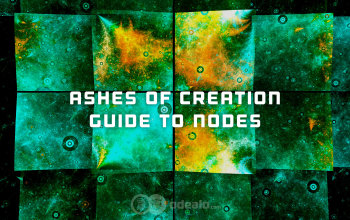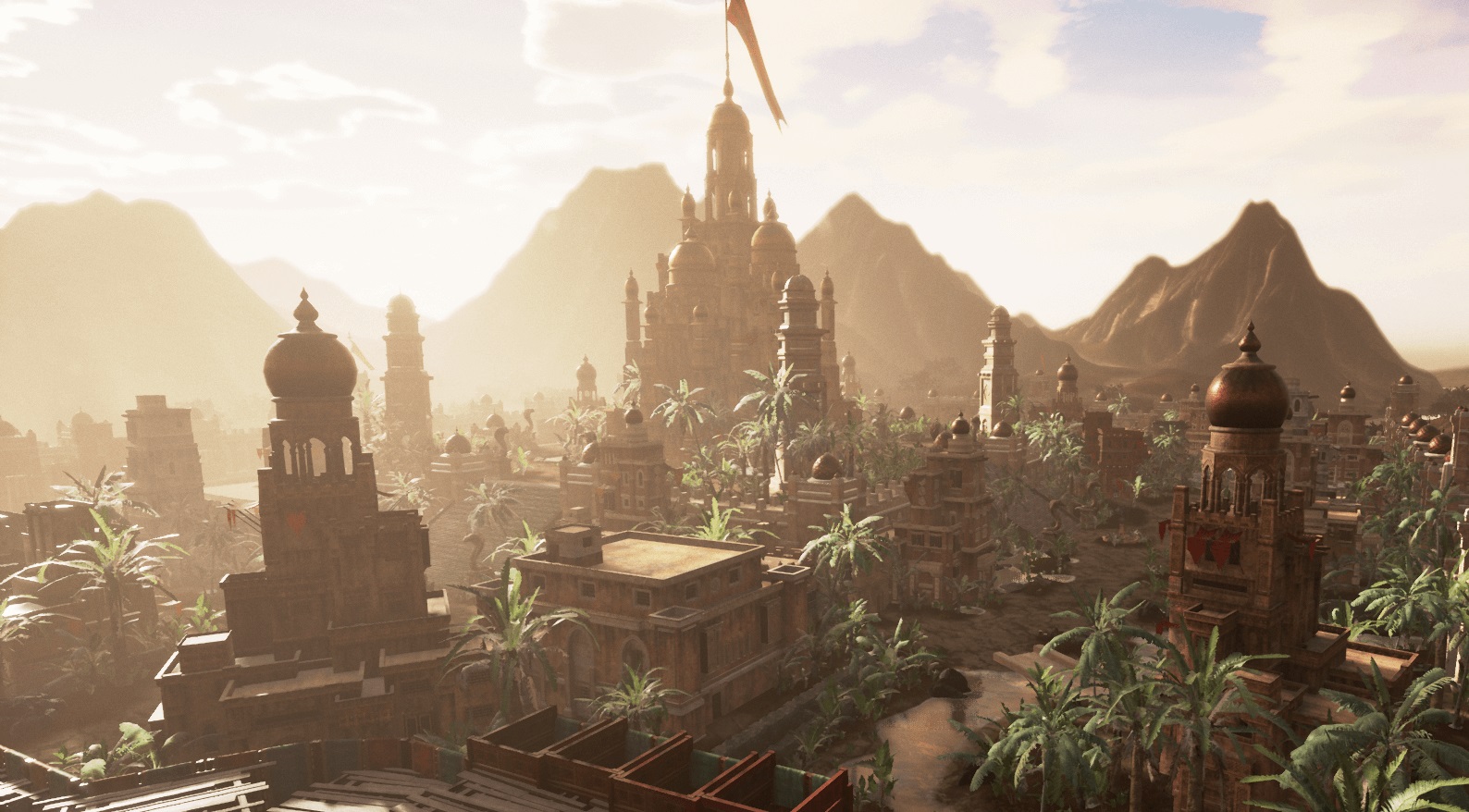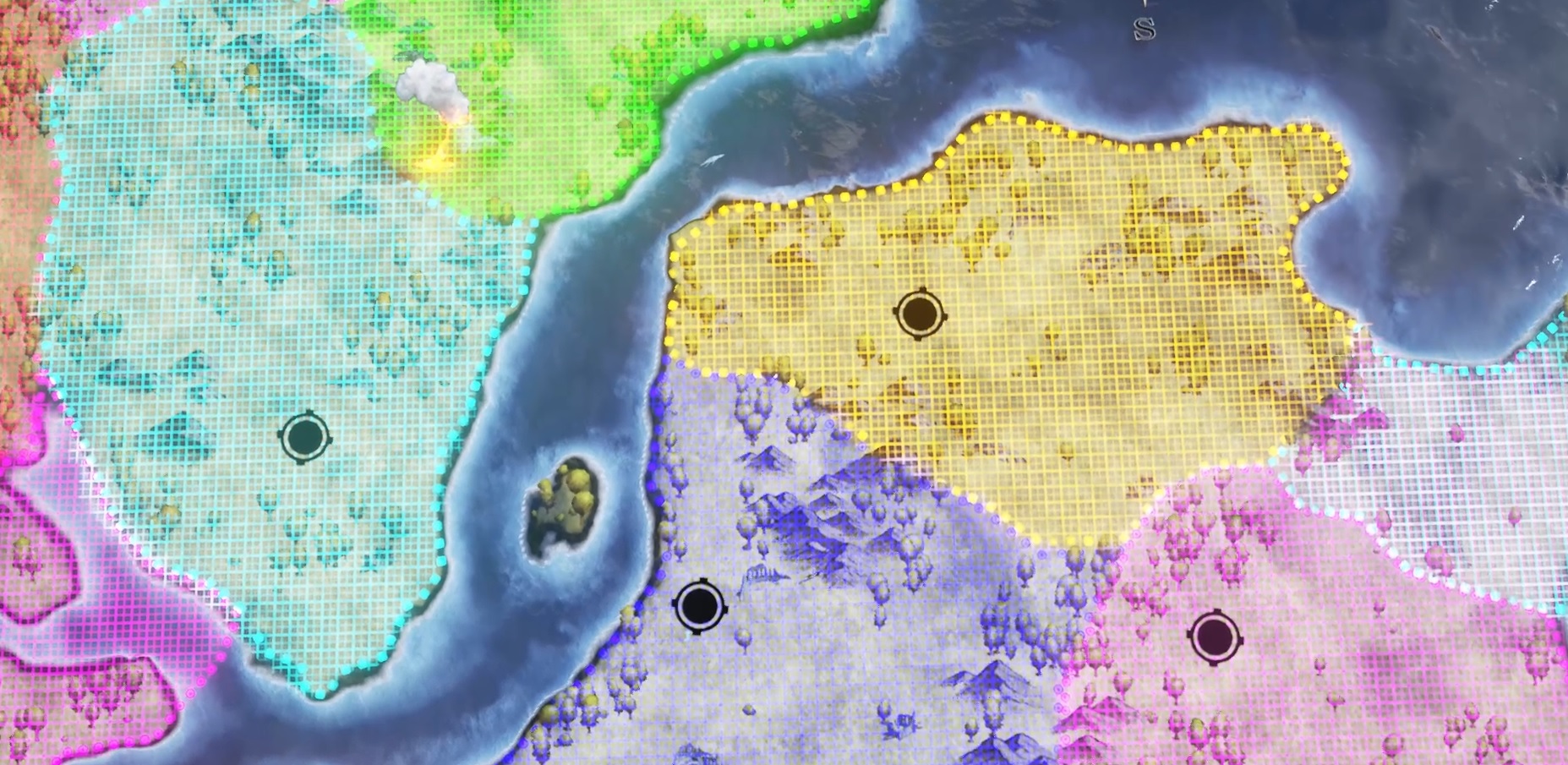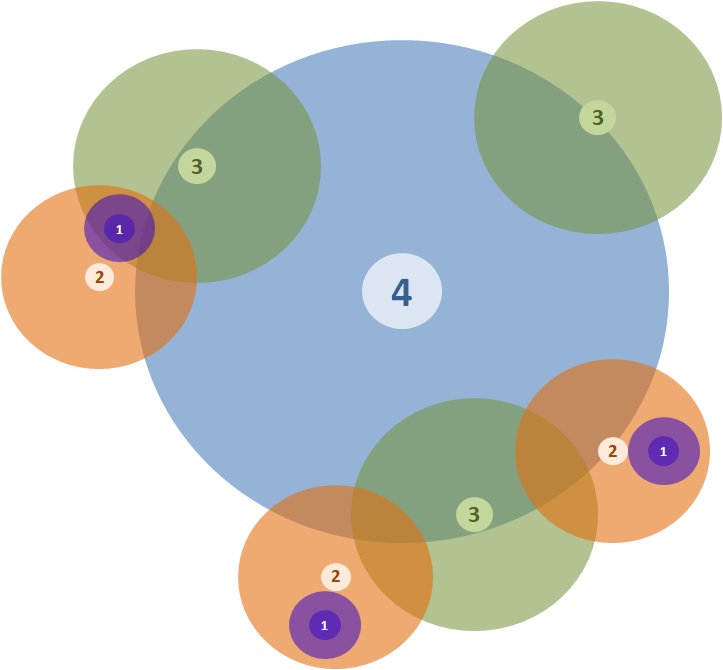
Ashes of Creation Nodes Guide
Ashes of Creation in-depth guide to Nodes systemCities Raise From the Ashes
Ashes of Creation Nodes Guide
Introduction
MMORPG worlds are static and mostly predetermined. It is the Developers who decide what level spread their Zones will have, where main Cities will be located, and what quests will be available. This creates a linear experience, you start at level 1 in Zone A, you progress through the predetermined content, level up a few times, move to zone B when you have gained enough experience, and repeat the whole process. This might be fun at the start but gets repetitive very quickly. Game Developers have tried to improve upon this experience in many ways, but the core problem remains the same - Zones are still predetermined and look exactly the same each time you progress through them, on each server, on each alt character. Boring.
The Intrepid Studios, Developers of the Ashes of Creation have proposed an interesting alternative to this very static and, well... obsolete system. The Node system on which their game is based creates A LOT of possibilities and gives Players the power to influence game worlds in ways impossible in other MMOs. Thanks to it every game server will be unique, and dynamic. Players actions will lead to the creation of Villages, Villages will become Towns, Towns will become Cities, Cities will raise in power and become Metropolises, the balance of power will shift, whole Civilizations will fall, Metropolises will be turned to ashes, and the cycle will start again, in a different place, led by different Players (please note that this is just a casual example, and the real Node system is much more complex, however, the base idea remains the same). Sounds interesting? There is much, much more to this system, and we will do our best to explain it in further sections of this Guide.

Metropolis, the last step in the Node's evolution
What are the Nodes
Explaining what Nodes are in simple terms is very difficult, as they can be a lot of things because their nature is very dynamic and malleable.
Nodes are the Seeds that can Spring into Civilization Centers if tended to by enough Players. They are planted in the pre-determined locations in the world and surrounded by their Zones of Influence (ZoI). Players actions performed within these Zones water the Seeds and let them grow over time, changing the surrounding environment, and unlocking unique area-related features. As the Seed grows its roots start to spread, this is reflected by the Node's expanding area of influence. The more advanced the Node, the further its influence reaches. This means that Heavily developed Nodes will influence surrounding Node locations.
At the start, there will be no Metropolises, Cities, Villages or even simple Camps on the game Servers. Instead, all of these will develop in a response to player activities performed within the Zones of Influence of certain Nodes. Developers state that there will be 103 Node locations at launch, and each of them will have its unique impact on world development and narrative.

Nodes and their Zones of Influence
How the Nodes Function
Each of the Nodes has its own experience bar. This experience bar is filled by Players who perform in-game activities within Node's zone of influence. Each experience gain within the Node's ZoI contributes towards its evolution. When enough experience is gained by the Node, it advances to the next Stage, and there are 7 stages of Node development:
- Stage 0 - Wilderness
- Stage 1 - Expedition
- Stage 2 - Camp
- Stage 3 - Village
- Stage 4 - Town
- Stage 5 - City
- Stage 6 - Metropolis
As a node develops, more services, infrastructure, merchants, and NPCs become available, and more defenses are placed to protect the Node from hostile activities. The Node's narrative, government system, and types of available services, NPCs, and buildings are determined by the Node Type. There are 4 unique Node Types, and each of them features certain traits:
- Divine Node - Focused on Equipment Augments, Skills and Faith Centers
- Economic Node - Focused on Merchants, Trade and Economic Prosperity
- Military Node - Focused on Class Training, Combat and Martial Power
- Scientific Node - Focused on Construction, Artisans, and Technological Development
When Node is at Stage 0, its type cannot be identified, but as soon as it reaches Stage 1, its unique Type-Related features start to show up, and corresponding NPCs Settle within it:
- Divine Node - Priests
- Economic Node - Merchants
- Military Node - Guards
- Scientific Node - Scholars
This means that Node has to be advanced at least once before its type is discovered. There are some predetermined rules, however:
- Node Type is permanent - it does not change at any stage of the Node's development, or after its destruction. Players will not be able to alter the Node's Type in any way.
- Nodes Types in the same locations on different servers are identical - if you have encountered a Military Node on Server A, you can be certain that the corresponding Node on Server B will also be Military, but the Node's Development Stage will most likely differ.
- Node's Player-Government will not have absolute power over the said Node's Development - Node development is partially automatic, and generated procedurally. Players Governing the Node will be able to choose and develop specific projects through building footprints available within the Node, however.
- Node's appearance and inhabitants depend on the Race that has contributed the most experience to its development - if the Node was developed mostly by Kaivek Orc Players, the Node's architecture will resemble Kaivek's culture, most of the NPCs populating it will be of Kaivek Orc origins, and questlines offered by them will be a part of the Kaivek narrative.
- All Node-Related Content corresponds with Node's Type and the Main Race that inhabits it - raids, dungeons, events, resources, and narratives available in a Node will reflect its Type and its Ruling race. This means that although the Node's Type cannot be changed, The Content available within it can, as all available Races have their own flavor.
- Dominant Races will have lower cultural influence over new Nodes - if a Race is widely spread across the World, and there are a lot of Cities dominated by it, the Influence Penalty will be imposed upon the said Race. This will ensure cultural diversity, more varied content, and the higher chance for the power struggle on each of the game's Servers.
The development time of a Node depends on its current Stage. The higher the Stage, the more time is needed for Node's advancement (this time can be of course altered by the number of Players involved in said Node's development):
- Stage 0 - Wilderness ⇒ Stage 1 - Expedition (no more than a few hours)
- Stage 1 - Expedition ⇒ Stage 2 - Camp (up to a few days, but most likely no more than 1)
- Stage 2 - Camp ⇒ Stage 3 - Village (a few days, most likely less than a week)
- Stage 3 - Village ⇒ Stage 4 - Town (a dozen or so days, most likely less than two weeks)
- Stage 4 - Town ⇒ Stage 5 - City (a few weeks, most likely no more than a month, depending on the number of Players involved)
- Stage 5 - City ⇒ Stage 6 - Metropolis (a few months)
Important Note: Nodes are subject to the Atrophy process. This means that they will slowly decay over time if there is too little Player-activity within their Zone of Influence, and might delevel. The daily Experience Deficit, proportional to the Node's current Stage is present within all Nodes. This deficit has to be covered before Experience gained by Players within Node's Zone of Influence can start to contribute towards said Zone's advancement. If this daily deficit is not covered, the remaining deficit Experience is removed from Node's total Experience pool, and so the Decay process starts. If the Node can't sustain the amount of Experience needed for its Current Stage, the deleveling process will start. This process is no immediate, however, and Players will have a chance to stop the Node's deleveling by providing it with enough Experience.
Node's Advancement Process
Once the Node reaches Stage 1, it starts to influence other surrounding Nodes. This influence stops surrounding Nodes from advancing to Stage 1. This limitation stays in place until the main Node reaches its Stage 2. After Stage 2 is reached by the main Node, surrounding nodes are able to reach Stage 1, but are blocked from reaching Stage 2. Once the Main Node advances to Stage 3 and becomes a Village additional mechanics come into play, and the real depth of the Node system becomes more apparent.
| Node Mechanics | |
| Vassal System | |
|
Nodes that have advanced to Stage 3 of their development and became Villages increase their influence on their lower-level neighbors, and subdue them. Those subdued Nodes become vassal states of the newly formed Village. Vassal Nodes have certain limitations and rules imposed on them:
Note: The subjugation itself is automatic, and any Node that falls within the Higher-Level Node's Zone of Influence will become its Vassal. Vassal Nodes are certainly dependant on their Overlord State, but they are by no means slaves. In fact, the Overlord-Vassal relationship is based on a very complicated set of Economic, Military and Political relations. Vassal Nodes are Overlord's Subjects, yes, but the Overlord itself is not self-sufficient and is therefore reliant on its Vassals. This means that it is in the Overlord's best interest to ensure the prosperity of all its Vassal States.
|
|
| Sieges | |
|
Once a Node reaches Stage 3 it becomes susceptible to hostile actions performed by enemy Player forces. If the enemy force is strong enough, it can attempt to Siege the Node. Successful Siege attempt will level the Sieged Node back to level 0 which is unambiguous with Node's complete destruction. The Sieges are very expensive, however, and their costs can be compared to the costs of leveling a Sieged Node to its current Stage. This creates a room for aggressive expansion of heavily Military-focused Player-factions that will inevitably form in the World of Verra, and forces the peace-loving Players to unite against them. The high Siege Cost and the fact that Defenders will lose all their possessions if their City falls create a staging for truly Epic and very Meaningful PvP Campaigns. The Siege development looks more or less like this:
Once all prerequisites are met, the Siege Countdown is initiated and can be seen by all Players present in the region. The Countdown length depends on the level of the Besieged Node (Village - 2 Days, Town - 3 Days, City - 4 Days, Metropolis 5 Days), and the SIege begins after the Countdown is finished (the time window for Sieges will depend on the Server location - the window will most likely be opened during Server's prime time to avoid sneaky night Sieges).
This system ensures that the balance of power on the Ashes of Creation servers will be very delicate, and any expansion attempts will be met with a definite response. Because the lack of the said response might just be the first step to the ultimate demise of a prosperous, and to this day, peacefull Node. Alliances will be formed, Great Leaders will raise, Metropolises will be leveled, new Cities will be built, and a lot of daggers will find their way into former allies backs... |
|
| Government | |
|
The first three stages od Node's development (Stage 0 - Stage 2) are automatic, and all Players can do to influence them is contributing enough experience to ensure their advancement. From Node Stage 3 (Village), however, Players get to govern the Node by themselves through the Government System. The way of electing the Player-Government body of a Node depends on its type:
As previously mentioned, Player-Governeurs of Nodes do not have absolute power over them, but their influence on the Node's development is considerable nevertheless. This influence can be executed, for example, through the construction of special buildings, and intromission of certain projects. These project and building plans will trigger special questlines that have to be completed by citizens in order to advance through the construction process. Moreover, specific resource-requirements will have to be met for the constructions to be finished. The exact list of available Government-dependent buildings is not yet confirmed by the developers, but those constructions will be most likely related to in-game Services available in Nodes. For example, to gain access to high-level Crafting a Blacksmith Workshop will have to be constructed, Marketplace will allow Players to more freely conduct Trade inside of the Node, and so on. The unofficial, and certainly not the final list of available buildings looks as follows:
Each of the available buildings will have a steep price tag, which means that the direction of the City development must be picked by its Governours. Moreover, the existing buildings will not be permanent, and successor Governors will be able to level them and construct other structures in their place. Note: Taxes collected in a Node do not fill the Government's pocket directly. Instead, Tax-money is used for the construction of said buildings or aiding Vassal states in various ways (by hiring Mercenaries, Constructing Walls, Funding Buildings, and so on). This system will be a bit different in Castles (these will be ruled by Guilds most likely). Monarch of a Castle will have direct access to a portion of Tax-Money and will be able to spend it as he pleases. Note: Government body of a Node can also engage in Diplomacy and Politic Disputes with other Nodes. However, Vassal Node Governments will have certain Diplomatic limitations imposed by their Overlord Node. Information on this topic is a bit scarce at the moment, and we will certainly cover this in much more detail when more information becomes available. |
|
| Player Housing and Node Citizenship | |
|
From Node's Stage 3 (Village) Players are able to purchase a Reel Estates and Freeholds within the said Node's Zone of Influence, and thereby become able to aspire for Node's Citizenship. The In-Node Housing (our Real Estates) will come in limited numbers and be quite expensive, and highly contested because of that. Freeholds are approximately 2 hectares in size and can be upgraded after their parent Node advances to the next Stage. Important Note: Only one Freehold can be owned per account across all servers, and one Static in-Node House (Real Estate) can be owned per server. Important Note: All Player-Characters present or created in the future, on the same server, and belonging to the same account will have their Citizenship automatically set to the same Node. This means that a Player with a single account cannot be actively involved in life and politics of more than a single Node. Note: If Player owns a Freehold in one Node and an Apartment/Real Estate in a second Node, he can transfer his Citizenship between them. This ability is limited by 14-day long Cooldown, however. This means that Citizenship is not required in order to own a property within the Node, but owning property within a Node is required in order to become that Node's Citizen. Note: Players who are members of a Guild that owns a Castle have dual Citizenship (in their Guild's Castle, and in the Node of their choice). Specific information on this topic is not yet available. Once Player becomes the Node's Citizen, some additional options become available to Him/Her:
Note: If Player didn't purchase a Real Estate in his Node of choice quick enough, he can still become its Citizen by purchasing an Apartment within it. This option becomes available only if the Node's Government Body has built a special Apartment Building (available for construction from Node Stage 4 (Town). Unlike Real Estates and Freeholds, these Appartments are located in the Node's instanced zones, which means that they are not accessible nor seen directly from Node's streets. The price of said Apartments scales with the number of already purchased Apartments, which means that more popular Nodes will have higher Apartment prices. Real Estates available in Nodes are not instanced. This means that every available in-Node House is physically visible to all Players. There are some rather interesting consequences of this fact:
|
|
| Node-Specific Building | |
|
At Stage 3 (Village), a Node gains access to a Special Building. The kind of this building is determined by the Node's Type (Divine, Economic, Military or Scientific). Specific information about these buildings is not yet available but judging by the fact that they will be Node-Type specific, they will probably provide a bonus based on the Node's specialization. Please note that the following is our educated guess and theory-craft, and will most likely largely differ from the final in-game version. We speculate that:
|
Node Type-Related Benefits
Ability to own a Real Estate, Freehold or an Apartment, the possibility of becoming a Node's Citizen, and the access to Citizen-Only In-Node buildings are not the only perks provided by Nodes. Each of the four before mentioned Node Types provides a unique set of benefits to its inhabitants. These benefits become active at the Node's Stage 6 (Metropolis) and cover the whole Node's Zone of Influence (and zone of influence of a Metropolis is about 20% of the map, as there is a hard cap of 5 Metropolises on each server). These benefits look as follows:
- Divine Metropolises give access to the special Service Quests.
- Economic Metropolises have massive, Zone-of-Influence-wide Marketplaces.
- Miliraty Metropolises have the ability to reduce Corruption's Duration.
- Scientific Metropolises create a fast-travel network between all Nodes within their Zone of Influence.
This perk system further differentiates the four Node Types from each other and promotes a diversified Server development (A Server with 5 Miliraty Metropolises will lose out on perks associated with the other 3 Node Types, which will most likely push Players to pursue Stage 6 Node diversity, and might cause massive Player-Faction conflicts).
|
END NOTE Please remember that Ashes of Creation is still in development, and all information featured in this Guide is subject to change. We promise you to keep this Guide up to date with all new information that becomes available as the time passes. We hope that you have found this Guide useful and informative. If we have missed a piece of information that is important to you, please let us know! Please do note that this is an early version of our guide, and we will be happy to receive constructive criticism, that will help us improve it, so leave your suggestions in the comments section below. |
Pictures used in this article are the intellectual property of Intrepid Studios
